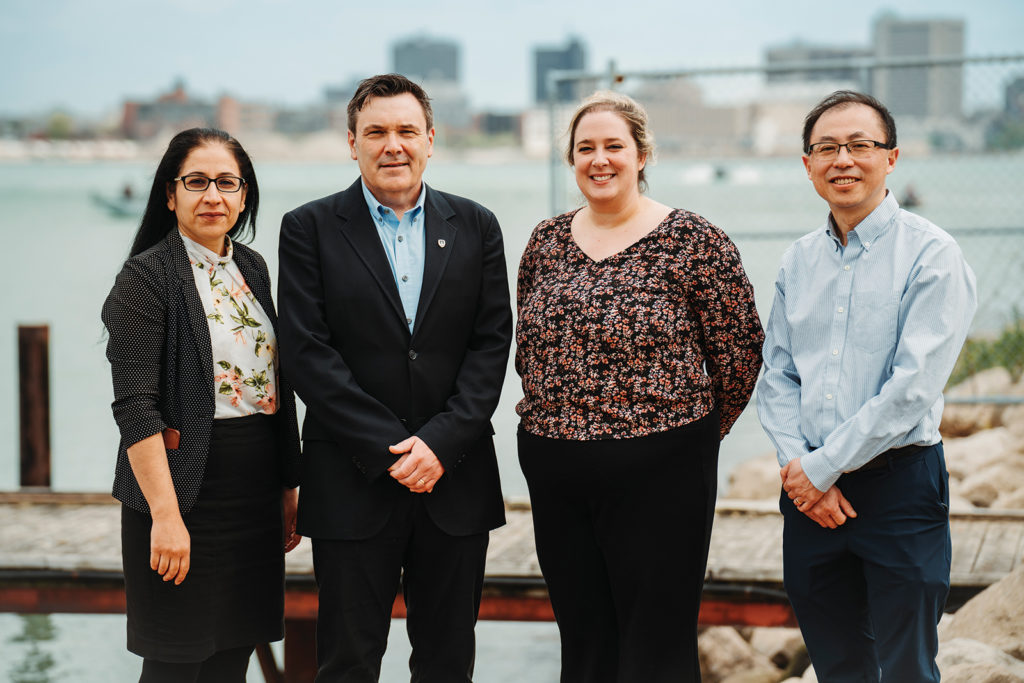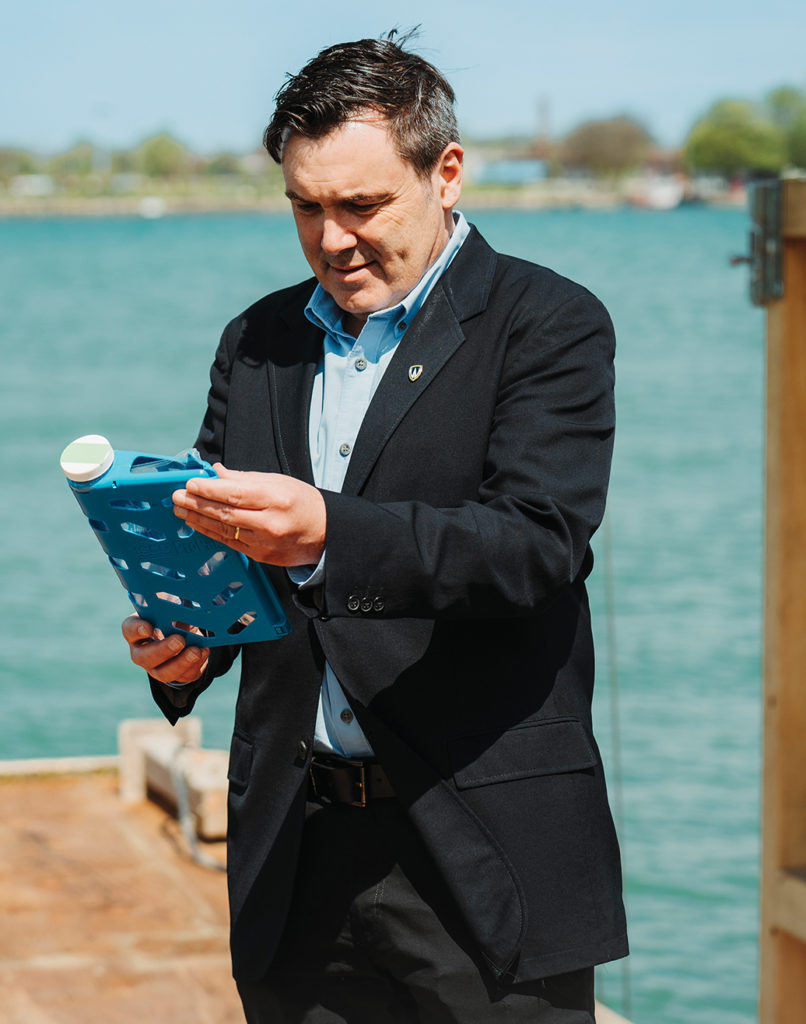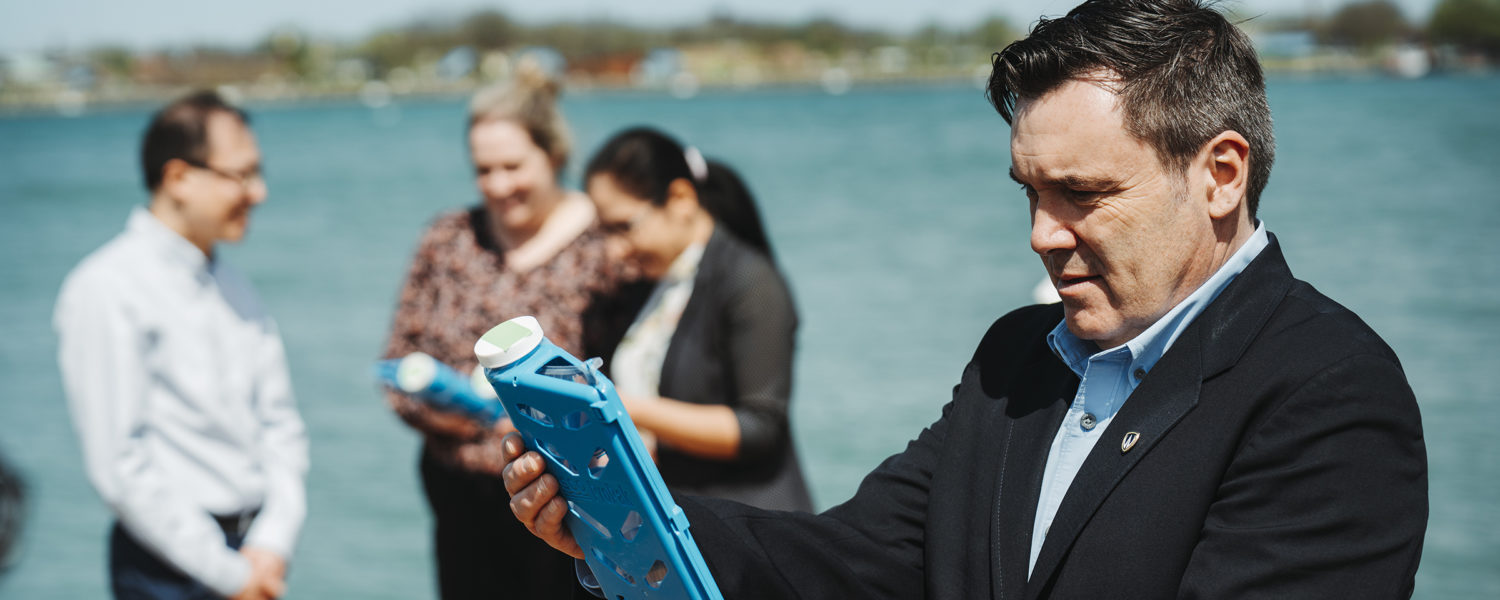Members of the University of Windsor Head-Up
A Project to Strengthen Supply Chain Lines in the
Event of Another Global Pandemic
Story by Matthew St. Amand
Photography courtesy University of Windsor
Prior to the early months of 2020, the idea of a global pandemic shutting down the world was the stuff of dystopian science fiction movies. Then we came face to face with COVID-19. During the tumultuous time that ensued, supply chains buckled, information came in sporadic, baffling bursts. Vaccines and personal protective equipment (PPE), such as masks and cleaning products, were scarce for far too long. The pandemic brought the world as close to a screeching halt as anything has in the past hundred years.
Nobody wants to live through that again and a team of experts at the University of Windsor is heading up a $15 million research project to ensure we do not. Known as INSPIRE (Integrated Network for the Surveillance of Pathogens: Increasing Resilience and Capacity in Canada’s Pandemic Response), the project is focused on strengthening Canada’s biomanufacturing sector in preparation for future pandemics.

According to a press release from the University of Windsor, the program “brings together 43 experts from seven universities and public and private agencies in Canada and the United States. This team of microbiologists, biochemists, engineers, computer scientists and experts in supply chains and public policy will look for ways to improve biomanufacturing and health sector supply chains, bolster cross-border trade and mobility as well as explore new technologies in pathogen surveillance.”
INSPIRE is headed by Dr. Mike McKay, director of the University of Windsor’s Great Lakes Institute for Environmental Research (GLIER), which is a founding member of the Ontario Wastewater Surveillance Initiative. Dr. McKay is joined at the project’s helm by Dr. Lawrence Goodridge, a professor in the Department of Food Science and director of the Canadian Research Institute for Food Safety within the Ontario Agricultural College (OAC).
“We need to shore up the ability of the private sector in Canada to meet demands of the health sector in case of another pandemic,” Dr. McKay explains. “We must learn from experience to develop proactive strategies to prevent the devastating impact of infectious diseases on the biomanufacturing and health sectors and improve efficiencies moving assets across borders.”
Dr. McKay’s research group at GLIER is key to this program because it provides an early warning system for outbreaks—such as COVID-19—by testing sewage for pathogens.
“We led the charge in Southwestern Ontario taking on this type of surveillance,” Dr. McKay says. “Most of the work we do at GLIER is focused on safeguarding the Great Lakes, but we also got involved in this when the pandemic struck. It’s a gold mine of information. Wastewater monitoring is cost effective and it really takes the pulse of the health of an entire community. And it’s not reliant on clinical samples, which come from people in the form of blood samples or nasal swabs, for example.”
Particularly during the Omicron outbreak in January 2022, clinical testing became overwhelmed. So many people were sick, testing labs could not keep up.
“That’s when the public health community really bought into wastewater surveillance,” Dr. McKay says.
The INSPIRE project is not only at the forefront of early detection of the next pandemic providing guidance to public health, but is also examining ways of strengthening Canada’s ability to respond to consumer and commercial needs.
“During the COVID-19 pandemic, we had supply chain shortages, we couldn’t get enough PPE in Canada, we weren’t making our own vaccines,” Dr. McKay says.

Funding for INSPIRE is coming from a larger, over-arching matrix of projects.
According to an announcement made on May 7 by federal Tourism Minister Soraya Martinez Ferrada, the $15 million going into INSPIRE is part of nearly $574 million in funding spread across 19 projects.
During the announcement, Minister Ferrada said: “The projects that we’re supporting today will strengthen our ability to supply medicines, vaccines and therapeutics for the benefit of Canadians. These collaborations between research hubs, post-secondary institutions and research hospitals will foster innovation across the country. Thanks to the work of experienced scientists in institutions at the cutting edge of innovation, Canada will be ready to respond to future health priorities.”
In theory, most people agree that planning ahead for catastrophe makes good sense. In practice however, detractors sometimes zero-in on costs alone, and question the need for thoroughness. One need look no further than the town of Fudai, Japan, as an example of “future-proofing” one’s community against calamity. Fudai survived the 2011 Tōhoku earthquake and tsunami that devastated much of Japan—where more than 20,000 people lost their lives or went missing. In the 1970s, Fudai’s then-mayor, Kotaku Wamur (who served ten terms and passed away in 1997 at age 88) oversaw the construction of a 51-foot floodgate between mountainsides at a cost of more than $30 million in today’s dollars. For years, the floodgates were described as the mayor’s folly; criticized as an expensive, wasteful project. Although Wamur did not live to see it happen, Fudai was saved by those floodgates in 2011. Other nearby communities that built less substantial, more cost-effective seawalls—such as Taro—were not so lucky.
Preparedness pays.
The INSPIRE program will also build strategic partnerships with researchers in Michigan, Ohio, and New York to create a cross-border pathogen surveillance network that covers regions where many supply chains supporting Canadian industry originate.
Those supply chains will be the focus of SCAN Health (Supply Chain Advancement Network), headed by CEO and scientific director Anne Snowden, a professor in the University of Windsor’s Odette School of Business and member of the INSPIRE team. SCAN Health designs, validates and scales collaborative supply chain solutions, practices and measurement tools to improve health system supply chain resilience and economic recovery in Canada’s post-pandemic future.
Expressing her gratitude for the confidence the government places in the university by funding INSPIRE, Shanthi Johnson, Vice-President – Research and Innovation at the University of Windsor, says: “This announcement speaks to our local to global scale expertise, experiences and excellence in research and innovation within the University of Windsor, our ability to engage a diverse cadre of experts and trainees and collaborate with other universities, community and industry partners throughout the province and in the United States.”
Everyone agrees that INSPIRE is an important initiative with the significant potential to improve the lives of Canadians and support the growth of Canada’s biomanufacturing and health sectors.




Add comment